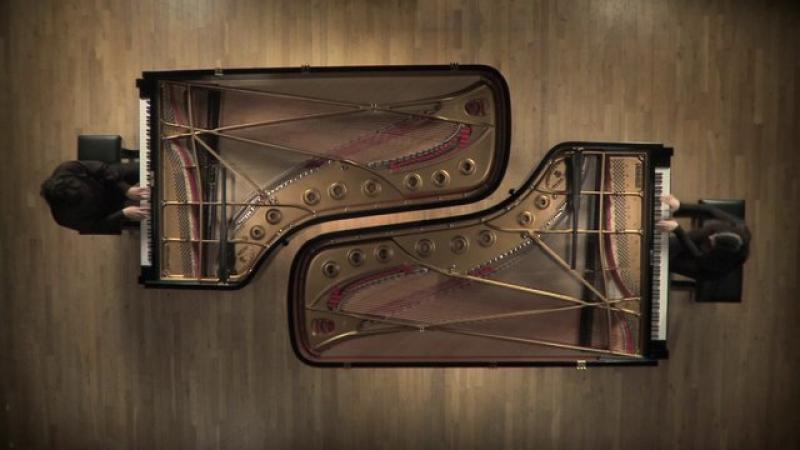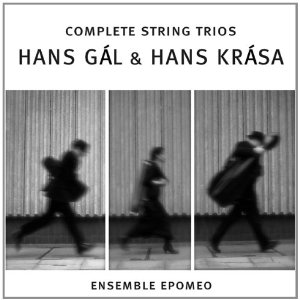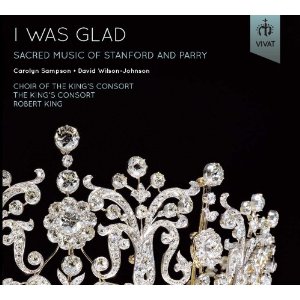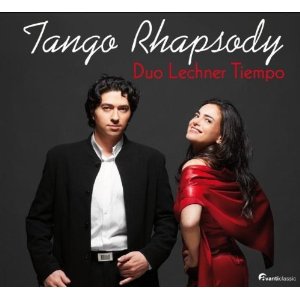Classical CDs Weekly: Gál, Krása, The King's Consort, Duo Lechner Tiempo | reviews, news & interviews
Classical CDs Weekly: Gál, Krása, The King's Consort, Duo Lechner Tiempo
Classical CDs Weekly: Gál, Krása, The King's Consort, Duo Lechner Tiempo
Bittersweet string trios, English choral music and fireworks from Argentina


Avie have already successfully exhumed the four symphonies by the Austrian émigré Hans Gál, who pitched up in Edinburgh in the 1940s and enjoyed a long academic career. His early Serenade in D for string trio epitomises his early style – breezy, neoclassical and full of busy counterpoint which never sounds too studied or pedantic. This is supremely approachable, engaging music, and sweetly played here – every chromatic kink handled with deft skill. Best is the closing Alla Marcia, dazzling in terms of its technical facility, and, evidently, very enjoyable to play. The Serenade is paired with Gál’s 1971 Trio in F sharp minor, a darker, brooding work originally featuring the viola d’amore – though a standard viola is heard here. Gál’s opening movement seems to hark back to fin-de-siecle Vienna, and the mood of bittersweet melancholy is neatly sidestepped in the trio’s closing minutes. Cellist Kenneth Woods describes Gál as the Viennese classical tradition’s “last, modest master” and it’s hard not to agree.
Also on the disc are several works by the Czech composer Hans Krása. He died in Auschwitz in 1944, having spent two years interned in the Theresienstadt ghetto - where the short Tanec and Passacaglia and Fuga for string trio were composed. This makes listening to both of these brilliantly communicative pieces an uneasy experience, each one a masterly exercise in musical doublespeak. I won’t attempt to describe them – buy this disc and experience them for yourself. Eloquent performances in glowing sound.

You feel slightly sorry for Parry and Stanford, both of whom would probably have been remembered far more kindly if Elgar hadn’t come along and stolen their thunder. Robert King’s new anthology makes a persuasive case for both composers’ music. Using period instruments and a medium-sized professional choir pays huge dividends, and it’s as if layers of dirty brown varnish have been stripped away from these scores. Parry’s music emerges as the strongest, and I was glad is resplendent here. The choir’s opening salvo is spine tingling, and so beautifully, clearly enunciated. Orchestrally it’s dazzling too, notably for the clarion sound of six narrow-bored trumpets and the organ of Hereford Cathedral scything through the texture. Parry reworked the piece for the 1911 Coronation, composing in addition an extravagant setting of the Te Deum. Parry’s youthful Milton setting, Blessed Pair of Sirens, cannily mixes Wagnerian harmony with a very English sensibility. All gorgeous, and we also get Elgar’s flamboyant, entertaining 1922 orchestration of Jerusalem.
Stanford’s more intimate, less showy music is slower to reveal its charms. Here, the G major Magnificat and Nunc dimittis stand out, blending Brahmsian rigour with a welcome hint of sensuality. Soprano Carolyn Sampson duets with Catrin Finch’s harp to sublime effect in the former. This is an impressive disc, well annotated and superbly recorded.

In which the brilliant Argentinian pianist Sergio Tiempo joins forces with his equally talented sister Karin Lechner, in an album of arrangements and newly commissioned tango-related works for two pianos and orchestra. The main attraction here is Federico Jusid’s three-movement Tango Rhapsody, a dazzler of a showpiece accentuating the tango’s potential for conflict between partners: “That confrontation between the performers that could swing from the most loving accordance to the sourest contention.” You have to watch the accompanying DVD. Orchestral players stamp feet, tap mouthpieces, before Tiempo sneaks on like a naughty child and begins pounding away. Predictably, but wittily, Lechner creeps on stage accompanied by a bluesy muted trumpet solo, her own music appropriately sultry. It’s brilliantly theatrical and darkly comic, and so consistently entertaining that you readily forgive Jusid any number of cheeky borrowings from Gershwin and Stravinsky. There’s not a wasted second in the work’s 18 minutes, the mood alternating between sweaty noir and exultant aggression. Possibly a modern masterpiece.
You’d be willing to pay full whack for the Tango Rhapsody on its own. Happily, the duo also provide a generous smattering of better known pieces by Astor Piazzola and Pablo Ziegler, who also provides the inventive arrangements. Unmissable – the most enjoyable disc I’ve heard so far this year.
- Watch the
Explore topics
Share this article
Add comment
The future of Arts Journalism
You can stop theartsdesk.com closing!
We urgently need financing to survive. Our fundraising drive has thus far raised £49,000 but we need to reach £100,000 or we will be forced to close. Please contribute here: https://gofund.me/c3f6033d
And if you can forward this information to anyone who might assist, we’d be grateful.

Subscribe to theartsdesk.com
Thank you for continuing to read our work on theartsdesk.com. For unlimited access to every article in its entirety, including our archive of more than 15,000 pieces, we're asking for £5 per month or £40 per year. We feel it's a very good deal, and hope you do too.
To take a subscription now simply click here.
And if you're looking for that extra gift for a friend or family member, why not treat them to a theartsdesk.com gift subscription?
more Classical music
 Jansen, LSO, Pappano, Barbican review - profound and bracing emotional workouts
Great soloist, conductor and orchestra take Britten and Shostakovich to the edge
Jansen, LSO, Pappano, Barbican review - profound and bracing emotional workouts
Great soloist, conductor and orchestra take Britten and Shostakovich to the edge
 Jakub Hrůša and Friends in Concert, Royal Opera review - fleshcreep in two uneven halves
Bartók kept short, and a sprawling Dvořák choral ballad done as well as it could be
Jakub Hrůša and Friends in Concert, Royal Opera review - fleshcreep in two uneven halves
Bartók kept short, and a sprawling Dvořák choral ballad done as well as it could be
 Hadelich, BBC Philharmonic, Storgårds, Bridgewater Hall, Manchester review - youth, fate and pain
Prokofiev in the hands of a fine violinist has surely never sounded better
Hadelich, BBC Philharmonic, Storgårds, Bridgewater Hall, Manchester review - youth, fate and pain
Prokofiev in the hands of a fine violinist has surely never sounded better
 Monteverdi Choir, ORR, Heras-Casado, St Martin-in-the-Fields review - flames of joy and sorrow
First-rate soloists, choir and orchestra unite in a blazing Mozart Requiem
Monteverdi Choir, ORR, Heras-Casado, St Martin-in-the-Fields review - flames of joy and sorrow
First-rate soloists, choir and orchestra unite in a blazing Mozart Requiem
 Cho, LSO, Pappano, Barbican review - finely-focused stormy weather
Chameleonic Seong-Jin Cho is a match for the fine-tuning of the LSO’s Chief Conductor
Cho, LSO, Pappano, Barbican review - finely-focused stormy weather
Chameleonic Seong-Jin Cho is a match for the fine-tuning of the LSO’s Chief Conductor
 Classical CDs: Shrouds, silhouettes and superstition
Cello concertos, choral collections and a stunning tribute to a contemporary giant
Classical CDs: Shrouds, silhouettes and superstition
Cello concertos, choral collections and a stunning tribute to a contemporary giant
 Appl, Levickis, Wigmore Hall review - fun to the fore in cabaret and show songs
A relaxed evening of light-hearted fare, with the accordion offering unusual colours
Appl, Levickis, Wigmore Hall review - fun to the fore in cabaret and show songs
A relaxed evening of light-hearted fare, with the accordion offering unusual colours
 Lammermuir Festival 2025, Part 2 review - from the soaringly sublime to the zoologically ridiculous
Bigger than ever, and the quality remains astonishingly high
Lammermuir Festival 2025, Part 2 review - from the soaringly sublime to the zoologically ridiculous
Bigger than ever, and the quality remains astonishingly high
 BBC Proms: Ehnes, Sinfonia of London, Wilson review - aspects of love
Sensuous Ravel, and bittersweet Bernstein, on an amorous evening
BBC Proms: Ehnes, Sinfonia of London, Wilson review - aspects of love
Sensuous Ravel, and bittersweet Bernstein, on an amorous evening
 Presteigne Festival 2025 review - new music is centre stage in the Welsh Marches
Music by 30 living composers, with Eleanor Alberga topping the bill
Presteigne Festival 2025 review - new music is centre stage in the Welsh Marches
Music by 30 living composers, with Eleanor Alberga topping the bill
 Lammermuir Festival 2025 review - music with soul from the heart of East Lothian
Baroque splendour, and chamber-ensemble drama, amid history-haunted lands
Lammermuir Festival 2025 review - music with soul from the heart of East Lothian
Baroque splendour, and chamber-ensemble drama, amid history-haunted lands
 BBC Proms: Steinbacher, RPO, Petrenko / Sternath, BBCSO, Oramo review - double-bill mixed bag
Young pianist shines in Grieg but Bliss’s portentous cantata disappoints
BBC Proms: Steinbacher, RPO, Petrenko / Sternath, BBCSO, Oramo review - double-bill mixed bag
Young pianist shines in Grieg but Bliss’s portentous cantata disappoints

Comments
Unbelievable that the
So, even after someone has